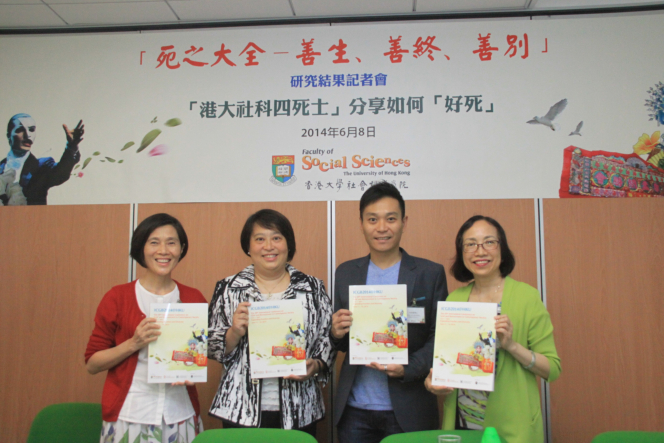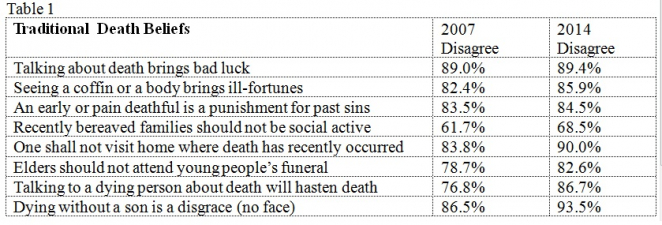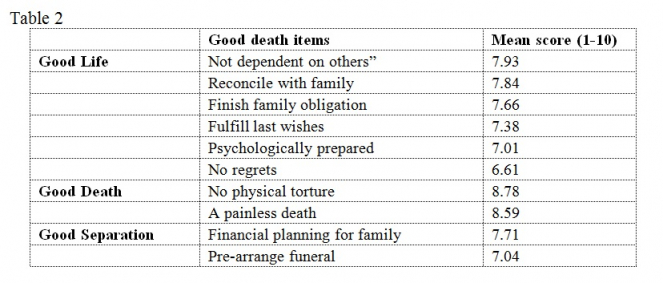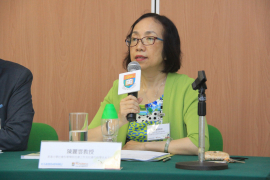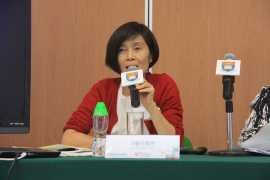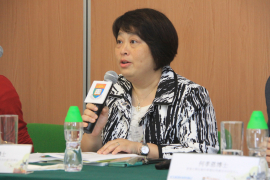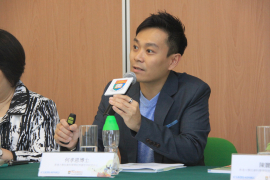Media
Four HKU death angels report on “encyclopedia of death: death preparation, bereavement support and good death”
09 Jun 2014
Four HKU death angels (from left) Professor Christine Fang, Dr Amy Chow, Dr Andy Ho and Professor Cecilia Chan report on “encyclopedia of death”.
In 2014, the Faculty of Social Sciences of the University of Hong Kong conducted a cohort survey with 464 Hong Kong residents, to examine their attitudes and perceptions on death and mortality. When compared to a similar cohort survey conducted in 2007, our findings show that the scores of both adults (59 or below) and elders (60 or above) on Fear of Death, which ranged from 1 to 7 with higher scores indicating greater fear, has decreased considerably and particularly for adults. As for the death avoidance, the score of adults has reduced significantly from 4.23 in 22007 to 2.2 in 2014, whilst the score for elders has also dropped from 3.1 to 1.71 within this seven year timespan. On the front of death preparation, the percentage of respondents having purchased life insurance has increased two-folds from about from 36% to 70%, while the willingness for organ donation has also risen four-folds from 11% to 43%. These figures clearly show that general that public’s attitude towards mortality and death preparation has become much more open and liberal.
This study also revealed that some traditional Chinese taboos on death has diminished in today's society (Table 1). Particular, the public are increasingly disagreeing with the notions that “one shall not visit home where death has recently occurred”, and “talking to a dying person about death will hasten death”, and “dying without a son is a disgrace”. Having said that however, 30% of survey respondents still believed that bereaved families should not be socially active for death is polluting and brings bad luck. About 14% still believed that talking to a dying person about mortality will accelerate the dying process, and another 17% believed that elderly parents should not attend their decedents' funeral for early deaths are considered unfilial. All of these longstanding taboos continue to have a negative impact on the governance of morality among Hong Kong and its people, highlighting the imperative of adopting a public health approach in pushing forth a continuous regime of public life and death education.
Bereavement Support
Bereavement is considered as the most painful life experience. Getting used to the increased connections with one another through advanced technologies, individual finds it difficult to tolerate the loss of contact. Missing someone is devastating, in particular of not knowing where they are after the death.
According to a survey carried out in 2012 with 106 bereaved family members of a palliative care unit in Hong Kong, among the 19 items of complicated grief, “I feel myself longing for the person who died” scored the highest in the first month after death. After 7 months, “I feel myself longing for the person who died” still scored the highest (Mean = 2.54/4). With regards to the greatest pain and separation distress, those who choose often and always to the item of “I feel myself longing for the person who died” contributed more than 50%, in the first and the seventh month.
Continuing bond
“Continuing bond” is the relationship between the bereaved and deceased. It can be manifested as hearing the voices, seeing the deceased, feeling the touch from the deceased, or smell the deceased as well as the sense of presence. It can also be appeared in the dreams, or carrying the mission and virtues of the deceased. The seeing, hearing, smelling and sensing the deceased can be considered as “Grief Hallucinations”, which are not uncommon.
In the survey carried out in 2012 in Hong Kong, there were about 25% and 17% of bereaved family members reported to have hearing the deceased in the first month and seventh month respectively. In the same study, there were 20% and 9% reported to have seeing the deceased in the first month and the seventh month after death respectively. Researches from the United Kingdom [Rees (1971)], the United States [Olson et al. (1985)], Iceland [Haraldsson (1988)], Sweden [Grimby (1993)] also showed that it is not an uncommon experience. These appear to be similar to the traditional Chinese belief of “the return of the spirits”.
Good Death
What is “good death”? According to a survey in 2004, the following scored the highest:
In order to prepare for good death, the Faculty of Social Sciences suggests the government and the community to fully implement the following:
- life and death education -- learning curriculum in formal and informal education, mass media and public education to reduce general public’s fear of death, death avoidance, death taboo and negative perceptions on morality; and to increase general public’s death knowledge and awareness as well as to enhance general public’s engagements in death preparation;
- end of life medical and nursing care -- adequate, appropriate and quality care; choices and decisions of advanced planning and directives in care and treatment in hospitals and in the community;
- personal and significant others preparation -- life reflection, settling relationships, last wishes, after death financial and funeral arrangements
To achieve the mentioned-above aspects, coordinated support across service disciplines and systems and integrated and aligned public service policies are required. This leads to a whole-system approached end of life care strategy.
The 10th International Conference on Grief and Bereavement in Contemporary Society
(June 11 to 14, 2014)
The 10th ICGB is a renowned tri-annual international event that brings together over 1000 local and overseas scholars, leading healthcare professionals and experts in Thanatology to provide a platform for knowledge exchange, skill sharing and multidisciplinary collaborations across cultural and geographical boundaries.
With funding support from the Hong Kong Jockey Club Charities Trust, the Faculty of Social Sciences of The University of Hong Kong, in collaboration with the Social Welfare Department and the International Conference on Grief and Bereavement in Contemporary Society, has the honour to bring this prestigious Conference to Asia and indeed, to the University, for the first time. Over 250 presentations will be held during the Conference for academic exchange and 20 professional training workshops will be organised to enhance the skills of healthcare professional and practitioners. Please refer to the attached leaflet for the highlights of the expert talks or visit www.hku.hk/socsc/icgb2014 for details.
Death Café Hong Kong
Death concerns every one of us, and many of us want to talk about it but never had the opportunity to. Recognition the importance of dialogue and discussion for attaining greater insights and understanding towards life and morality, the Faculty of Social Science of the University of Hong Kong is supporting the launch of the first-ever Death Café in Hong Kong (https://www.facebook.com/deathcafehongkong). At a Death Cafe people, often strangers, gather to eat cake, drink tea and discuss death. The objective is 'to increase awareness of death with a view to helping people make the most of their finite lives'. Please feel free to join us with the details as below:
Date: June 14, 2014
Time: 3:00pm to 5:00pm
Venue: BIJAS Vegetarian Restaurant (G/F Run Run Shaw Tower, Centennial Campus, HKU)
For the powerpoint presentation, please click : http://www.socsc.hku.hk/icgb2014/press/eng
Media enquiry:
Miss Rhea Leung, Manager, Communication and Public Affairs Office (Tel:2857 8555 / 9022 7446 email rhea.leung@hku.hk)
Miss Vanessa Sit, Assistant Registrar, Faculty of Social Sciences (Tel: 3917 1203 / 92678877 email: vansit@hku.hk)

